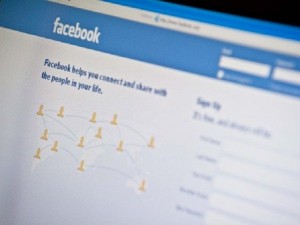Facebook execs hit the road to persuade investors
NEW YORK – Facebook, already assured of becoming one of the most valuable US firms when it goes public later this month, now must convince investors in the next two weeks that it is worth all the hype.
Top executives at the world’s leading social network have kicked off their all-important road show on Wall Street – an intense marketing drive ahead of the company’s expected trading launch on the tech-heavy Nasdaq on May 18.
For small investors, the California firm has produced a slick half-hour video set to music that explains the mission, products, finances and future of the company, with chief executive Mark Zuckerberg doing the narration himself.
At JP Morgan Chase, one of the banks with a lead role in Facebook’s initial public offering, the scene was flashy, with large Facebook-blue flags draped outside the New York headquarters to welcome the company’s executives.
In a filing with the US Securities and Exchange Commission on Thursday, Facebook set a price range of $28 to $35 for its shares, which would value the firm at between $70 billion and $87.5 billion.
Based on the estimated market value, Facebook would rank behind Amazon and Cisco, each worth over $100 billion, but ahead of Hewlett-Packard ($48 billion) and struggling Yahoo! ($19 billion).
If all stock options that could be exercised in the next one to two years are taken into account, the value would rise to between $91 billion and $97 billion – or up to 26 times the turnover Facebook posted in 2011.
When Google went public in 2004, its valuation was $23 billion, and now it has a market value of $200 billion – only five times its turnover.
Some are offended by the price set for Facebook, a site founded by Zuckerberg just eight years ago from his Harvard dorm room. Still only 27, he will retain 57.3 percent of the voting power of the shares.
Others expected better – some analysts predicted a price of $44 a share in the short term, and a much higher figure in the long term.
At the heart of the debate about Facebook’s true value is how much revenue it takes in.
Revenue vaulted to $1.06 billion in the quarter ended March 31 – an improvement year-over-year, but down about six percent from the previous quarter. Eighty-five percent of the total came from ad sales.
As one analyst noted, however, Facebook only bills about five percent of the $600 billion spent each year on online advertising – even though at least one of every seven minutes spent online around the world is spent on Facebook.
Such figures mean there is a wide margin for improvement, seeing as the social network has more than 900 million users and is constantly expanding its membership.
The company must strike a delicate balance between the need to make money, the need to limit the use of tools that track user behavior so as to sharpen ad efficiency, and the need to keep the site from reaching its saturation point.
“Facebook could in the short term double its revenues by cramming more ads onto the page, but that would be a very short-term strategy — two years later, you’d have users walking away,” Emily Pereira, a spokeswoman for social media marketing firm Wildfire, told AFP.
But other analysts say they hope that once Facebook is listed, it will heed investors’ wishes and focus more on the company’s bottom line — and making money more quickly.
Some like Jeff Corbin, head of the financial communications group KCSA, say Facebook must transcend the media hype and answer some tough questions before the IPO.
“What is the plan to diversify the company’s revenue?” Corbin asked.
“Is Mr Zuckerberg trying to have his cake and eat it too? Reap the benefits of being a public company and, at the same time, maintain the benefits of controlling a private company?”
